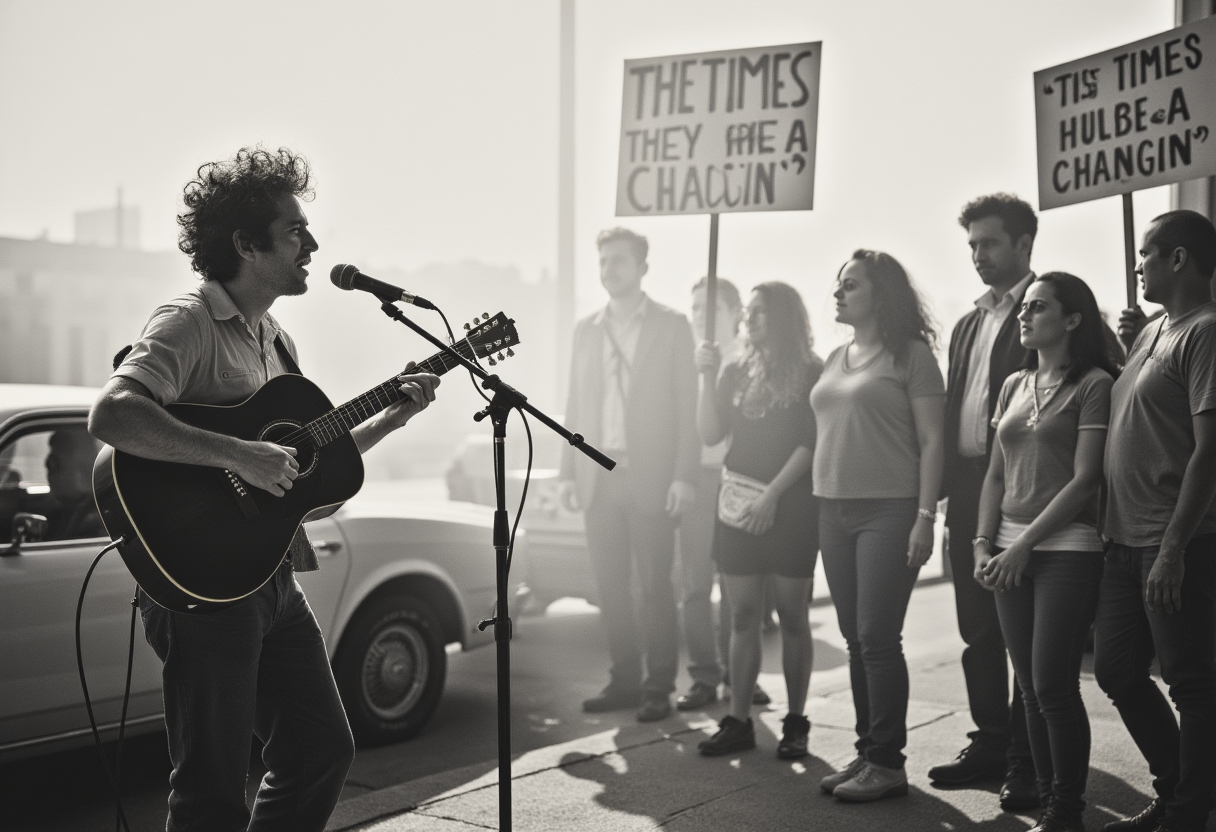How Lyrics Reshape Our World
A split image. On one side, a person (diverse representation) is comically belting out lyrics in the shower, mouth wide open, hair wet, with a shampoo bottle as a makeshift microphone. On the other side, the same person is subtly humming or whispering the same lyrics during a very formal meeting, looking outwardly serious but with a hint of a smile, trying to suppress the earworm.
Picture this: you’re making coffee, and a line from a song slips into your head — a tiny phrase that won’t let go.
We tend to credit grand speeches, political manifestos, or scientific breakthroughs for reshaping the world. But a simple string of words set to music can do the same work in quieter, stranger ways.
Beyond melody and rhythm, lyrics have a way of burrowing into our minds, sparking images and emotions,
and sometimes nudging how we think about ourselves and the wider world.
This isn’t just about liking a good song; it’s about how song lyrics carry meaning that reverberates across lives and cultures.
Read on to see how a catchy chorus, a satirical verse, or a heartfelt line can quietly reshape perspectives and spur unexpected change.
When a Hook Becomes a Habit: The Viral Power of Catchy Choruses
A chorus can latch onto your mind the way a scent pulls you back to a moment. In seconds, an earworm can turn a quiet commute or morning coffee into a private sing-along.
Earworms aren’t random — they’re proof that certain song lyrics and melodies are engineered (or accidentally designed) to stick. Those repeated lines show up in meetings, showers, and family dinners, turning a single song into a shared cultural moment.
Take "Baby Shark": a simple, repetitive ditty that erupted into a global phenomenon, invading playgrounds and playlists alike. Its strange, irresistible loop is a case study in how a short string of words can travel far beyond its original audience.
Or look at "Gangnam Style" (2012), which shattered YouTube records and proved a catchy chorus transcends language, culture, and age — prompting millions to copy a dance and share a moment worldwide.
And then there’s "I Will Survive": more than a disco hit, its chorus evolved into an anthem of resilience, showing how song lyrics can carry deep emotional meaning and empower listeners across contexts.
Even contemporary acts — from viral TikTok hooks to alternative bands like twenty one pilots — show the same dynamic: short, memorable lines spread fast, shaping how people talk, feel, and connect.
A vibrant, dynamic street scene featuring people from various cultures and age groups (toddlers, teenagers, adults, seniors) spontaneously performing Psy's "horse dance" from "Gangnam Style" in different public spaces – a park, a city street, perhaps even a conference hall. The mood is joyful, unifying, and slightly absurd.
In short, catchy choruses do more than loop in your head. They create shared rituals and moments of connection that can ripple through communities and cultures.
The Grinning Truth: How Parody and Satire Expose and Transform
If catchy choruses pull us together, parody and satire push us to think. These witty, often biting songs don’t just provoke laughter — they spotlight social absurdities and hypocrisies with a wink.
Satirical lyrics flip the serious and mundane, turning poignant moments into punchlines so we can see familiar ideas from a fresh angle. A parody can make a heartfelt ballad feel suddenly ridiculous, prompting listeners to reconsider the original meaning behind the words.
Consider how "I Will Survive" has inspired playful riffs on dating misadventures and office meltdown anthems; those parodies nudge us toward self-reflection while we laugh. Artists like "Weird Al" Yankovic (whose "Eat It" parodied Michael Jackson’s hit in 1984) show how clever lyric substitutions can critique culture — in his case, consumer obsession — while remaining irresistibly catchy.
Today, parody lives on in viral TikTok spoofs and YouTube lampoons, proving that whether it’s a cheeky jab at politics or a send-up of everyday parenting, humorous lyrics help people across generations — from pop fans to alternative acts like twenty one pilots and one pilots followers — find common ground.
Ultimately, satire’s power lies in its double play: it entertains while sharpening our view of the world, using laugh-out-loud moments to open the door to change.
The Unintended Anthem: When Musicians Become Accidental Activists
Beyond satire’s sharp nudge and a hook’s infectious loop, lyrics reshape the world in another, quieter way: by becoming accidental anthems. Some songs start as personal musings and end up as public declarations.
These are the moments when a writer rhymes "moon" with "June" and suddenly finds the line adopted by crowds — a private phrase turned public rallying cry.
Bob Dylan, young and earnest, strumming an acoustic guitar under a subtle, metaphorical shift in lighting or background.
Consider Bob Dylan: a young songwriter whose lines in "The Times They Are A-Changin’" (mid-1960s) were quickly embraced by protest movements, transforming personal metaphor into generational voice.
Dylan’s lyrics were taken up on marches and in gatherings, showing how a simple, resonant message can capture the mood of an era without the author intending it as a manifesto.
Queen’s "We Will Rock You" (1977 era) began as a stadium-ready chant; its stomps and claps combined with defiant lyrics to become a unifying call used at sports events and, at times, protests — an example of how participatory music morphs into collective expression.
Rage Against the Machine, though deliberately political, demonstrates the flip side: songs like "Killing in the Name" moved beyond the band’s original context to fuel grassroots action, showing how raw lyrical intent can inspire sustained public dissent.
Even quieter songs can gain unexpected weight. Simon & Garfunkel’s "The Sound of Silence" carried lyrics that listeners later read as commentary on social apathy and isolation, turning private melancholy into public conversation.
Today, modern acts — including bands like twenty one pilots — produce lines that fans interpret in many ways, proving that contemporary songwriting still breeds accidental anthems. Has a song ever become your anthem? Share it and tell us why.
The Echo Endures: A Lyric’s Lasting Legacy
These examples show a simple truth: small lines can have big consequences. A catchy chorus, a satirical hook, or an intimate ballad can all nudge how people feel, talk, and act.
Lyrics have the power to awaken introspection, spark laughter, and—even quietly—ignite change. They become the connective tissue that links private feelings to public conversation.
Next time a song pops into your head, pause and notice what that line means to you. Is it comfort, rebellion, or a shared joke? Paying attention to the meaning behind song lyrics helps you see how culture shifts, one memorable phrase at a time.
If a particular song ever changed how you see the world, share it below — whether it was an old favorite, a moment with twenty one pilots, one pilots, or even a tune about the stars. Join the conversation and help map the small lyric-to-large-change journey.
Earl Lee
"Thanks for reading. Until next time, keep exploring Florida's peculiar charm!"
Florida Unwritten Staff



